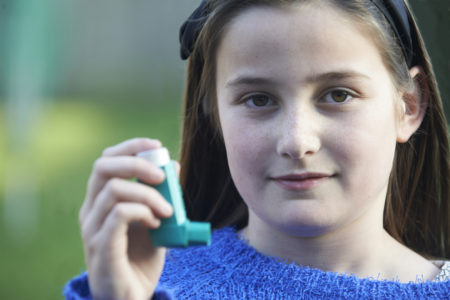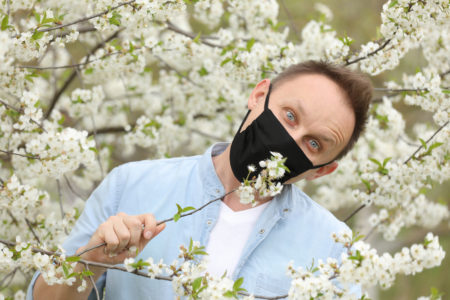Respiratory Alert for asthmatics! If you have asthma, you know summer is replete with asthma and allergy triggers. We commonly alert you to asthma triggers in a blog like this every summer. But this summer is different. This summer, we are dealing with COVID-19. And thus, FLASS is heightening our respiratory alert for asthma patients.
Big Scary Rumor Behind This Week’s Special Respiratory Alert

Summer Brings Asthma Triggers. Know Your Symptoms and Follow Your Asthma Action Plan.
Last spring, a dangerous myth began circulating about asthma medicine and COVID-19. People were saying that Albuterol or quick relief rescue inhalers would suppress the immune system. They added that taking asthma medicines would therefore make asthma patients more susceptible to the coronavirus.
False! Untrue! The doctors and staff here at FLASS want you to know this scary rumor is simply, unquestionably untrue. Our respiratory alert states, “Take your medicine; keep your asthma under control.”
- In the First place, these medications are bronchodilators. They are not corticosteroid. What they do is “relax the muscles in the airways when you are coughing and wheezing.” And that is a very good thing.
- Plus, you must remember to continue using your rescue inhaler as needed for asthma symptoms. You know this is the protocol when you accidentally encounter a trigger.
- Experts agree that “The most iimportant thing is to have your asthma well-controlled so that if infection does occur, your lungs are better able to handle the virus.”
Know Your Signs and Symptoms:

It Isn’t Easy to Give Up Summer Fun, But Look Out For Asthma Triggers.
Like asthma, COVID-19 is a respiratory disease. Be aware that both diseases can affect your lungs, throat, and your nose.The CDC has sent out its alert to people with asthma ever since the Pandemic began. Be aware if you have asthma, “infection with the virus could lead to an asthma attack, pneumonia, or other serious lung disease.” There is a study that shows “asthma doesn’t raise your chances of getting infected with COVID-19. But if you do get sick, your symptoms could be worse than other people’s because you already have trouble breathing.”
Signs and Symptoms of Coronavirus and Asthma: Monsters With Many Heads
Either one of these diseases has a long list of symptoms. Several symptoms of them overlap. This fact also motivated us to send out this FLASS official respiratory alert.
On the one hand, if we look at the most common COVID-19 symptoms, we see they include:
- Fever and Fatigue
- A dry cough and Loss of appetite
- Body aches
- Shortness of breath
On the other hand, Symptoms of asthma include these:
- Chest tightness and Coughing.
- Shortness of breath
- That awful whistling or sound of the wheeze when you breathe out.
Comparison Shopping and Your Symptoms
Obviously from the above lists, the two respiratory conditions share some of the warning signs. This is another reason we are publishing a respiratory alert.
Respiratory Alert: Asthma or Something Attacks Your Respiratory System

If You or Someone You Love Has Asthma in Our COVID-19 Summer, Take Extra Care with the Coronavirus Protocols.
Can you discern the cause if you begin experiencing a short attack of coughing and shortness of breath? Perhaps you can. However, be sure to pay attention to other symptoms that do not overlap. For example, “early studies have found that 83% to 99% of people with COVID-19 have a fever, although it might be mild.”
FLASS Respiratory Alert: Taking Action if You Have Both COVID-19 AND Asthma Symptoms
So, you might want to know exactly what you should do if you have both coronavirus and asthma symptoms? In previous year, you might have become anxious if you have asthma and started getting signs of the flu or a summer cold. Ironically, the same rules for watching those respiratory symptoms also work for watching COVID-19 symptoms.
- Symptoms: Set “A”
FLASS recommends that you should talk to the doctor or healthcare provider if your symptoms are basic.” Remember that video is a powerful tool, and a new way to talk to your doctors and healthcare providers here at FLASS. So speak with with your doctor or FLASS if you have:
- A cough
- Fever or
- Shortness of breath
- Symptoms: “Set B”
FLASS strongly suggests you dial your doctor or 911 right away if you are experiencing these symptoms:
- You’ve been having a slight asthma attack, but the asthma medicine doesn’t help like it typically does.
- If you are experiencing chest pain or pressure, in spite of your normally controlled status, the sensation should send you right to the phone for immediate medical help.
- Likewise, if you just can’t catch your breath, please get immediate help.
- A patient can usually feel this alarming development in his or her respiration because they have so much trouble breathing, they cannot talk.
Respiratory Alert: Advanced Symptoms
- Along with your respiratory attack, you get a sudden feeling of confusion. That is a cry from your respiratory system for medical help—and oxygen.
- Then, with a shock, you realize your lips or your face has begun turning blue or blue-gray. That is a sure sign you need immediate medical attention.
How Asthma Patients are Surviving in the Age of COVID-19
We have rules that will help you control your asthma and avoid the coronavirus. Rules are tough to follow, but they beat the alternative. In the first place, continue to take your asthma medicine. Stick to your FLASS Asthma Action Plan. Secondly, if your know summer has a lot of triggers for you, stay home.
Terrific Take-Aways from our Respiratory Alert
Finally, FLASS advises you to be certain you have a good supply of emergency rescue medicines on hand. As we follow the course of COVID-19 restrictions, we also suggest the following tips for your asthma:
- Use your inhaler properly. Don’t get sloppy with it.
- Be sure you keep your nebulizer clean.
- Stay away from asthma triggers such as smoke, pollen, unfamiliar foods, insects, campfires and air pollution.

Image of young woman doctor touching icon of media screen
Likewise we know you will avoid airplanes at this time. And, of course you, as an asthmatic, are used to avoiding close contact with people. So observe the social distancing rules. We have to tell you that it is not a good time to be visiting people in hospitals or sick friends. Please, avoid crowds.
We Understand the Frustration and the Fear
Just when you feel like your asthma is under control, here comes coronavirus. We get it. You already had a lot of summer triggers to deal with and now you have the extra anxiety of COVID-19.
Our asthma and lung disease patients are part of our extended family here at FLASS. Watch this blog for more information on dealing with COVID-19 as well as other respiratory conditions.
Thank you for visiting the FLASS online resource and remember: We’ve got your back, and we will get through this COVID-19 summer 2020, together.

